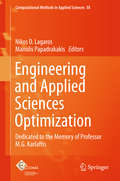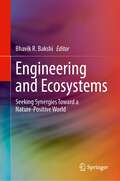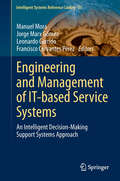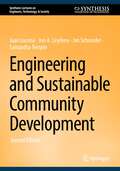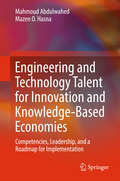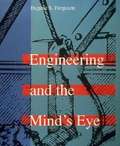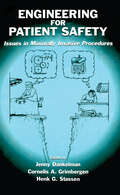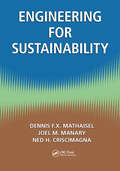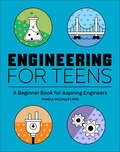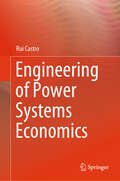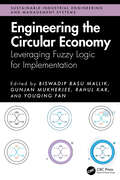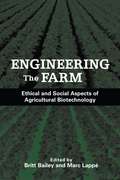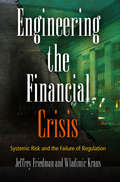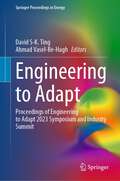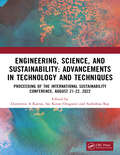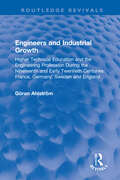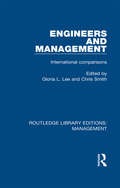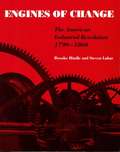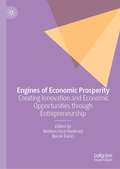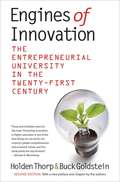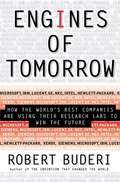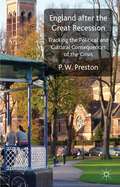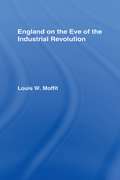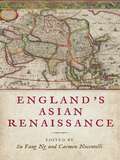- Table View
- List View
Engineering and Applied Sciences Optimization
by Manolis Papadrakakis Nikos D. LagarosThe chapters which appear in this volume are selected studies presented at the First International Conference on Engineering and Applied Sciences Optimization (OPT-i), Kos, Greece, 4-6 June 2014 and works written by friends, former colleagues and students of the late Professor M. G. Karlaftis; all in the area of optimization that he loved and published so much in himself. The subject areas represented here range from structural optimization, logistics, transportation, traffic and telecommunication networks to operational research, metaheuristics, multidisciplinary and multiphysics design optimization, etc. This volume is dedicated to the life and the memory of Professor Matthew G. Karlaftis, who passed away a few hours before he was to give the opening speech at OPT-i. All contributions reflect the warmth and genuine friendship which he enjoyed from his associates and show how much his scientific contribution has been appreciated. He will be greatly missed and it is hoped that this volume will be received as a suitable memorial to his life and achievements.
Engineering and Ecosystems: Seeking Synergies Toward a Nature-Positive World
by Bhavik R. BakshiThis book demonstrates how the inclusion of nature in engineering decisions results in innovative solutions that are economically feasible, ecologically viable, and socially desirable. It advances progress toward nature-positive decisions by protection and restoration of ecosystems and respect for ecological boundaries. The topic of this book is an active area of academic research, and leading companies are including goals associated with ecosystem services in their sustainability plans. This book is the first collection of methods and applications that explicitly include the role of nature in supporting engineering activities and describes the role that ecosystems play in supporting technology and industry. It describes approaches, models, applications, and challenges for innovation and sustainability that will be useful to students and practitioners.
Engineering and Management of IT-based Service Systems
by Jorge Marx Gómez Manuel Mora Leonardo Garrido Francisco Cervantes PérezIntelligent Decision-Making Support Systems (i-DMSS) are specialized IT-based systems that support some or several phases of the individual, team, organizational or inter-organizational decision making process by deploying some or several intelligent mechanisms. This book pursues the following academic aims: (i) generate a compendium of quality theoretical and applied contributions in Intelligent Decision-Making Support Systems (i-DMSS) for engineering and management IT-based service systems (ITSS); (ii) diffuse scarce knowledge about foundations, architectures and effective and efficient methods and strategies for successfully planning, designing, building, operating, and evaluating i-DMSS for ITSS, and (iii) create an awareness of, and a bridge between ITSS and i-DMSS academicians and practitioners in the current complex and dynamic engineering and management ITSS organizational. The book presents a collection of 11 chapters referring to relevant topics for both IT service systems and i-DMSS including: problems of selection of IT service providers, optimization of supply chain systems, IT governance decisions, clinical decision support, dynamic user-interface adaptation, re-engineering of processes, and generic decision problems. Advanced IT technologies used in some chapters are: fuzzy multi-criteria mechanisms, semantic processing, data mining processing, and rough sets. Other chapters report traditional DSS mechanisms but used or suggested to be used in innovative mode for IT service engineering and management tasks.
Engineering and Product Development Management: The Holistic Approach
by Stephen C. ArmstrongThis practical guide to the components of engineering management employs a holistic approach. It will help engineers and managers understand how to improve the product development process by deploying new technology and new methods of working in concurrent teams. The book integrates elements from six well-known and understood bodies of knowledge: integrated product development, project management, process management, systems engineering, product data management, and organizational change management. These elements are framed within an overall enterprise-wide architecture. The techniques discussed work for both huge multinational organizations and smaller enterprises. The emphasis throughout is on practical tools for engineers, managers, and consultants responsible for project and product development.
Engineering and Sustainable Community Development (Synthesis Lectures on Engineers, Technology, & Society)
by Jen Schneider Juan Lucena Jon A. Leydens Samantha TempleThis book presents an overview of engineering as it relates to humanitarian engineering, service-learning engineering, peace engineering, or engineering for community-led development, programs that are often grouped under Engineering for Good or Engineering for Change. By placing “community” at the center of these endeavors, this book invites readers and practitioners to strive for sustainable community development (SCD). This 2nd edition is centered on new concepts of community-led development and includes topics on the history of engineers and development, the problems of using industry-based practices when designing for communities, how engineers can prepare to work with communities, and listening in community development. Two case studies are provided to highlight the book’s concepts using first-hand experiences of engineers engaged with communities—one of engineers developing a windmill for a community in India, and a second of an engineer mapping communities in Honduras for improved water management. The book concludes with student perspectives and experiences from a curricular model focused on engineering for sustainable community development. Overall, the text invites engineers to reflect and prepare themselves for global careers that involve international development in both the for-profit and non-profit sectors. This 2nd edition places community-led practices at the heart of these endeavors. The book is for engineering faculty, students and practicing engineers, involved in current or future community collaborations. The authors wrote this book with a goal to help readers critically reflect on their own practices and perceptions. Readers learn to question past, current, and future frameworks in the project of development, and are encouraged to adopt practices of community-led development. This 2nd edition is aimed at engineering students who, as future global engineers, are faced with opportunities and challenges when working with communities. As funding for renewable energy, “green jobs,” and community-based initiatives continue to increase, engineers will need to rely on the social and historical concepts presented in this book.
Engineering and Technology Talent for Innovation and Knowledge-Based Economies: Competencies, Leadership, and a Roadmap for Implementation
by Mahmoud Abdulwahed Mazen O. HasnaThis book introduces and analyzes the models for engineering leadership and competency skills, as well as frameworks for industry-academia collaboration and is appropriate for students, researchers, and professionals interested in continuous professional development. The authors look at the organizational structures of engineering education in knowledge-based economies and examine the role of innovation and how it is encouraged in schools. It also provides a methodological framework and toolkit for investigating the needs of engineering and technology skills in national contexts. A detailed empirical case study is included that examines the leadership competencies that are needed in knowledge-based economies and how one university encourages these in their program. The book concludes with conceptual modeling and proposals of specific organizational structures for implementation in engineering schools, in order to enable the development of necessary skills for future engineering graduates.
Engineering and the Mind's Eye
by Eugene S. FergusonIn this insightful and incisive essay, Eugene Ferguson demonstrates that good engineering is as much a matter of intuition and nonverbal thinking as of equations and computation. He argues that a system of engineering education that ignores nonverbal thinking will produce engineers who are dangerously ignorant of the many ways in which the real world differs from the mathematical models constructed in academic minds.
Engineering for Patient Safety: Issues in Minimally Invasive Procedures (Human Error and Safety)
by Jenny Dankelman Henk G. Stassen Comelis A. GrimbergenThis is a brief study of how human factors engineers have worked with medical personnel to improve patient safety and reduce medical error in the newest minimally invasive surgical procedures (laparoscopy, angioplasty, colonoscopy, etc).
Engineering for Sustainability
by Dennis F.X. Mathaisel Joel M. Manary Ned H. CriscimagnaSustainability and sustainable development have become popular goals. They have also become wide-ranging terms that can be applied to any entity or enterprise on a local or a global scale for long time periods. As enterprises and systems become more complex and development a support costs increase, the question remains: how does one engineer an ent
Engineering for Teens: A Beginner Book for Aspiring Engineers
by Pamela McCauleyExplore engineering as a career with this introduction for ages 12 to 16The job of an engineer is to solve all sorts of complex challenges facing the world while improving our lives through creative, innovative ideas. This engineering book for teens gives you a look into what engineers do and how they drive society forward through math and science.From designing tablets and smartphones to reimagining the way we collect and store renewable energy, this engineering book for teens introduces you to the major engineering disciplines and their distinct specialties, famous engineers throughout history, and more.Engineering for Teens offers:Engineering fundamentals—Discover the four main branches of engineering and their different specialties.Inspired inventions—Get examples of the incredible things that engineers have created, like fuel cells and medicines.Inclusivity in engineering—Learn all about the diversity within the field of engineering.Discover the wonders of engineering and prepare yourself for a life of scientific discovery with this engineering book for teens.
Engineering of Power Systems Economics
by Rui CastroThis textbook is a comprehensive resource designed for university master's students on power systems, with a focus on engineering-related aspects. It covers all the fundamental principles of power systems economics.PhD students seeking to enhance their understanding of power systems economics from an engineering standpoint will also benefit from this book. It offers in-depth analysis and detailed insights into economic engineering aspects, presenting various models that are meticulously explained.Furthermore, practising engineers from all disciplines will find this book useful as it provides practical solutions to real-world engineering issues. Through worked examples and solved problems derived from existing installations, professionals can apply the knowledge gained in their everyday work. From a broader perspective, the book caters to the growing number of individuals interested in the economics of power systems, whether driven by professional obligations or self-education.What sets this book apart from existing literature is its unique approach, establishing a strong connection between economics and engineering. Unlike traditional texts that predominantly focus on economic theory, this book bridges the gap by offering practical applications within the power system context. The first part looks into classic economic theory, exploring subjects such as producers and consumers, market behavior, and general market structures, always with a clear connection to power systems. Numerous examples from the power system industry enrich the learning experience. In the second part, the theory presented in the first section is applied to power system-specific problems. These include an in-depth examination of different costs in power systems, regulation strategies, and the intricacies of electricity markets.Overall, this book provides a valuable resource for universitystudents, PhD candidates, and engineers alike, offering a unique blend of economic theory and engineering applications.
Engineering the Circular Economy: Leveraging Fuzzy Logic for Implementation (Sustainable Industrial Engineering and Management Systems)
by Gunjan Mukherjee Biswadip Basu Mallik Rahul Kar Youqing FanImplementing the circular economy necessitates innovative approaches capable of managing the complexity and uncertainty inherent in the shift from linear to circular systems. Fuzzy logic, a computational approach inspired by human reasoning, provides a promising framework for navigating these complexities. With a practical approach, this book offers how fuzzy logic can be utilized to implement the circular economy.Engineering the Circular Economy: Leveraging Fuzzy Logic for Implementation discusses the significance of incorporating fuzzy logic into circular economy strategies. This integration enables the development of adaptive models for resource management, waste reduction, and supply chain optimization. The book showcases various case studies and practical examples to demonstrate the application of fuzzy logic in implementing circular economy principles across diverse industries. Additionally, it addresses the challenges and future directions within a circular economy framework, emphasizing the importance of identifying these challenges and exploring future directions for continuous improvement in sustainability efforts. The potential of combining engineering, fuzzy logic, and the circular economy to address global sustainability challenges is highlighted, showcasing how leveraging fuzzy logic facilitates informed decision-making and the creation of innovative solutions as we work toward a more sustainable future.With its forward-thinking approach and focus on practical applications, this book is an essential resource for practitioners, researchers, engineers, scholars, and policymakers looking to promote innovation and sustainability in today’s rapidly changing economic and environmentally conscious environment.
Engineering the Farm: The Social and Ethical Aspects of Agricultural Biotechnology
by Britt Bailey Marc LappeEngineering the Farm offers a wide-ranging examination of the social and ethical issues surrounding the production and consumption of genetically modified organisms (GMOs), with leading thinkers and activists taking a broad theoretical approach to the subject. Topics covered include: the historical roots of the anti-biotechnology movement ethical issues involved in introducing genetically altered crops questions of patenting and labeling the "precautionary principle" and its role in the regulation of GMOs effects of genetic modification on the world's food supply ecological concerns and impacts on traditional varieties of domesticated crops potential health effects of GMOsContributors argue that the scope, scale, and size of the present venture in crop modification is so vast and intensive that a thoroughgoing review of agricultural biotechnology must consider its global, moral, cultural, and ecological impacts as well as its effects on individual consumers. Throughout, they argue that more research is needed on genetically modified food and that consumers are entitled to specific information about how food products have been developed.Despite its increasing role in worldwide food production, little has been written about the broader social and ethical implications of GMOs. Engineering the Farm offers a unique approach to the subject for academics, activists, and policymakers involved with questions of environmental policy, ethics, agriculture, environmental health, and related fields.
Engineering the Financial Crisis
by Jeffrey Friedman Wladimir KrausThe financial crisis has been blamed on reckless bankers, irrational exuberance, government support of mortgages for the poor, financial deregulation, and expansionary monetary policy. Specialists in banking, however, tell a story with less emotional resonance but a better correspondence to the evidence: the crisis was sparked by the international regulatory accords on bank capital levels, the Basel Accords.In one of the first studies critically to examine the Basel Accords, Engineering the Financial Crisis reveals the crucial role that bank capital requirements and other government regulations played in the recent financial crisis. Jeffrey Friedman and Wladimir Kraus argue that by encouraging banks to invest in highly rated mortgage-backed bonds, the Basel Accords created an overconcentration of risk in the banking industry. In addition, accounting regulations required banks to reduce lending if the temporary market value of these bonds declined, as they did in 2007 and 2008 during the panic over subprime mortgage defaults.The book begins by assessing leading theories about the crisis--deregulation, bank compensation practices, excessive leverage, "too big to fail," and Fannie Mae and Freddie Mac--and, through careful evidentiary scrutiny, debunks much of the conventional wisdom about what went wrong. It then discusses the Basel Accords and how they contributed to systemic risk. Finally, it presents an analysis of social-science expertise and the fallibility of economists and regulators. Engagingly written, theoretically inventive, yet empirically grounded, Engineering the Financial Crisis is a timely examination of the unintended--and sometimes disastrous--effects of regulation on complex economies.
Engineering to Adapt: Proceedings of Engineering to Adapt 2023 Symposium and Industry Summit (Springer Proceedings in Energy)
by David S-K. Ting Ahmad Vasel-Be-HaghThis book collates important contributions from Engineering to Adapt (ETA2023). Eta, η, the 7th letter of the Greek alphabet, is scrupulously used to denote efficiency and this is what ETA2023 strives for. In context, efficiency, η, is about avoiding waste, may this be energy, time, money, or material, in accomplishing something useful. As such, ETA2023 aims at bringing experts and future leaders together to forge more efficient ways to engineer and live. In other words, ETA2023 strives to synergise and catalyse all stakeholders, enthusiasts, and experts from academia, industry, policy arenas, and the general public, to formulate novel ways to improve tomorrow.This symposium will disseminate recent progress and promote collaborations to maximize opportunities for innovative integrated solutions. Topics of interest include resource and energy efficiency, waste reduction, and eco-friendly agriculture, architecture, engineering, and living.
Engineering, Science, and Sustainability: Advancements in Technology and Techniques
by Dimitrios A Karras Sai Kiran Oruganti Sudeshna RayISC 2022 is dedicated to the Niti Aayog policies to promote sustainability through exchange of ideas emerging out of the academia. The ISC is an annual conference that is held in virtual mode until COVID restrictions on travel exist. The vision of the conference is to capacitate Academia with the necessary ideas that provide insights of the grassroot level development to various stakeholders of the Niti-Aayog policies. Towards this goal, the conference creates a conjunction of various stakeholders of Niti-Aayog policies that include- academic institutions, government bodies, policy makers and industry. The ISC organizers make concerted efforts to promote academic research that would technological, scientific, management & business practices, and insights into policy merits & disruptions. The framework of exchange of ideas is geared towards adoption of deep technologies, fundamental sciences & engineering, energy research, energy policies, advances in medicine & related case studies. This framework enables the round table discussions between the academia, industry and policy makers through its range of plenary and keynote speakers.
Engineers and Industrial Growth: Higher Technical Education and the Engineering Profession During the Nineteenth and Early Twentieth Centuries: France, Germany, Sweden and England (Routledge Revivals)
by Göran AhlströmUsing an economic-historical and comparative approach, this book, first published in 1982, studies the structure and development of the engineering profession in France, German, Sweden and England. Central issues include the number of engineers in a particular society, their education and fields of work after education, the social background of the engineer, their social standing, the role of the state in technical education, and the development and role of the engineering organisations in various respects. The study shows that in three of the four countries, engineers achieved professional status rapidly and became members of their country’s establishment. In the fourth, England, not only did properly qualified engineers enjoy a considerably lower social status, but in numbers they were far fewer than in other parts of Europe. The author discusses this inadequacy in terms of industrial output and development.
Engineers and Management: International Comparisons (Routledge Library Editions: Management #43)
by Gloria L. LeeOriginally published in 1992. In an increasingly competitive climate, well-trained, experienced management is vital for establishing the long term future of industry. In response to this need, the number of management training courses have been growing in recent years. However, there is a group of highly skilled professionals who are not always recognized for their management potential. Engineers, often viewed as nothing more than technicians, are a valuable but neglected human resource. Their expertise has helped to generate the recent organizational restructuring throughout the manufacturing industry. This study compares the situation of engineers in Britain with those in other countries. It analyzes the industrial cultures of countries that have developed along very different traditions such as Japan, Germany and Hungary as well as countries like Canada and the US where British traditions have prevailed but where the outcomes are different. Bringing together leading writers on management who have specialist knowledge of the engineering profession, it covers such issues as education, employment and labour relations to show how far engineers are undervalued in British culture. This book should be of interest to undergraduates, MBA students, academics and researchers in management, engineering, new technology, industrial sociology and organizational behaviour.
Engines of Change: The American Industrial Revolution 1790-1860
by Brooke Hindle Steven LubarTHE MATERIAL ASPECTS OF AMERICAN LIFE UNDERWENT GREAT CHANGE in the period from 1790 to 1860, a pattern of development often referred to as the American Industrial Revolution. At the center of this transformation was a series of technological developments that were directly associated with labor, management, and organizational change. This book's discussion begins with physical survivals of technologies of that era, most of them preserved in the Smithsonian Institution. The book, like the exhibition from which it is derived (also entitled Engines of Change), endeavors to look through these artifacts to gain an understanding of the Industrial Revolution that differs significantly from popular perceptions. Specific insights can be gained from three dimensional survivals and from two dimensional views that are neither available in written accounts nor communicable through words alone. The photographs, drawings, and maps included here are, consequently, more than mere illustrations, more than a pleasant way to underline the written text. Indeed, in some ways they constitute the book's primary message. At the same time, the most obvious message conveyed by artifacts and pictures is limited by its unavoidable specificity. It must always be placed in a larger and broader context. Occasionally, observers bring enough context with them to interpret the artifacts they see, but usually extended verbal explanation is required to make objects and pictures truly meaningful. That is the purpose of the text of this book- to provide the context, to look through the physical survivals to an enriched comprehension of the technology and related aspects of the American Industrial Revolution.
Engines of Economic Prosperity: Creating Innovation and Economic Opportunities through Entrepreneurship
by Meltem Ince-Yenilmez Burak DariciThis book considers the extent to which innovation and entrepreneurship are engines of economic prosperity. It brings together theorists and empiricists from diverse backgrounds to provides a comprehensive overview of the field of entrepreneurship, focusing specifically on entrepreneurial developments within Turkey and the surrounding regions and Europe. It looks at innovation, creativity, economic development and women’s empowerment. This book considers the for-profit and the not-for-profit sectors, and examines outcome metrics such as change, sustainability and employment, in addition to economic value. This book will inspire academics and students to better understand the origins, evolution and impact of new ideas, new organizations, and new industries, and the impact on the economy. This book offers an excellent foundation for investigating and questioning current entrepreneurial practices across developed economies. It will also provide the foundations for researching and evaluating new and existing approaches to emerging technologies. Additionally, the book will offer useful insights into the real world, and will appeal to academics in economics and business as well as those studying entrepreneurship on the international scene.
Engines of Innovation
by Holden Thorp Buck GoldsteinInEngines of Innovation, Holden Thorp and Buck Goldstein make the case for the pivotal role of research universities as agents of societal change. They argue that universities must use their vast intellectual and financial resources to confront global challenges such as climate change, extreme poverty, childhood diseases, and an impending worldwide shortage of clean water. Combining their own experiences cultivating an entrepreneurial mindset within one of the nation’s elite public universities with detailed descriptions of the approaches taken by others, Thorp and Goldstein provide not only an urgent call to action but also a practical guide for our nation's leading institutions to become major players in solving the world's biggest problems. The result is a provocative and thoughtful beginning to an important conversation among educators, their supporters and trustees, policymakers, and the public at large as to how the American research university can best meet its societal responsibilities. InEngines of Innovation, Holden Thorp and Buck Goldstein make the case for the pivotal role of research universities as agents of societal change. They argue that universities must use their vast intellectual and financial resources to confront global challenges such as climate change, extreme poverty, childhood diseases, and an impending worldwide shortage of clean water. Combining their own experiences cultivating an entrepreneurial mindset within one of the nation’s elite public universities with detailed descriptions of the approaches taken by others, Thorp and Goldstein provide not only an urgent call to action but also a practical guide for our nation's leading institutions to become major players in solving the world's biggest problems. The result is a provocative and thoughtful beginning to an important conversation among educators, their supporters and trustees, policymakers, and the public at large as to how the American research university can best meet its societal responsibilities.
Engines of Tomorrow: How the World's Best Companies Are Using Their Research Labs to Win the Future
by Robert BuderiThe U.S. economy is the envy of the world, and the key to its success is technological innovation. In this fascinating and in-depth account reported from three continents, Robert Buderi turns the spotlight on corporate research and the management of innovation that is helping drive the economy's robust growth. Here are firsthand communiqués from inside the labs of a reborn IBM, resurgent GE and Lucent, research upstarts Intel and Microsoft, and other leading American firms -- as well as top European and Japanese competitors. It was only a few years ago that competitiveness experts -- U.S. well-wishers and naysayers alike -- concluded that America had lost its business and technological edge. The nation's companies, they asserted, couldn't match the development and manufacturing efficiency of overseas rivals. Yet now the nation is humming along, riding an unparalleled wave of innovation. Buderi tells us this turnaround has come on many fronts -- in marketing, sales, manufacturing, and the creation of start-up companies. But Engines of Tomorrow deals with a central element that has gone largely unexamined: corporate research. It's the research process that provides the technologies that spur growth. Research is behind the renaissance of IBM, the stunning growth of Lucent, and much of the steamrolling American recovery. Focusing on the fast-moving communications-computer-electronics sector, Buderi profiles some of the world's leading thinkers on innovation, talks with top inventors, and describes the exciting technologies coming down the pike -- from information appliances to electronic security and quantum computing. In the process, he examines the vital strategic issues in which central labs play a determining role, including: How IBM's eight labs around the world figure in Lou Gerstner's plans to achieve consistent double-digit growth -- and to join GE as a $100 billion concern. Why Xerox's famed Palo Alto Research Center is vying to resuscitate its company's lagging fortunes by sending anthropologists into the field to study the hidden ways people really work. What Hewlett-Packard will do without its original instrument business, recently spun off as Agilent Technologies. The business was central to HP Labs' MC2 philosophy of merging research expertise in measurement, computation, and communication -- and its departure removed a lot that was unique about HP. How the November 1999 federal court finding that Microsoft operates a monopoly hinders the Seattle giant's acquisition plans and makes it increasingly vital for nine-year-old Microsoft Research to lead the way in innovating from within. Could this be the next great lab for the twenty-first century?With authority and undaunted optimism about the underlying vitality of the research process, Buderi discusses these issues and reveals the future of some of the world's best and most powerful companies.
England after the Great Recession
by P. W. PrestonAn exploration of the recent financial crisis which argues that the hitherto dominant intellectual and policy paradigm of neo-liberalism has been fatally weakened and will in due course be replaced. The implications of the crisis for politico-cultural identities and our sense of ourselves as members of an ordered society are explored.
England on the Eve of Industrial Revolution
by Louis W. MoffitPublished in the year 1963, England on the Eve of the Industrial Revolution is a valuable contribution to the field of Economics.
England's Asian Renaissance (The Early Modern Exchange)
by Jennifer Feather Amrita Sen Richmond Barbour Abdulhamit Arvas Thea Buckley Nedda Mehdizadeh Rachana Sachdev Emily SoonEngland's Asian Renaissance explores how Asian knowledges, narratives, and customs inflected early modern English literature. Just as Asian imports changed England's tastes and enriched the English language, Eastern themes, characters, and motifs helped shape the country's culture and contributed to its national identity. Questioning long-standing dichotomies between East and West and embracing a capacious understanding of translatio as geographic movement, linquistic transformation, and cultural grafting, the collection gives pride of place to convergence, approximation, and hybridity, thus underscoring the radical mobility of early modern culture. In so doing, England's Asian Renaissance also moves away from entrenched narratives of Western cultural sovereignty to think anew England's debts to Asia. Published by the University of Delaware Press. Distributed worldwide by Rutgers University Press.
